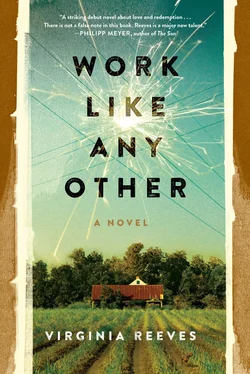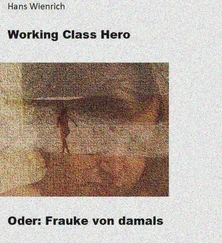“I have a moment,” Marie told the man from Alabama Power.
The day was already warm, the night’s chill burned away. The mockingbirds were loud in the pecan trees, and a solitary crow called out from the roof of the barn.
Marie sat down in one of the porch rockers.
“Is this a bad time, ma’am?”
“No worse than any other.” She motioned to the chair across from her. “Please sit.”
Marie knew that the girl who’d made her dead mother’s bed had grown into the cold woman she was now. She hadn’t meant to turn out this way, but once the push started, she’d been incapable of reversing it. She was not a welcoming woman, not kind. She was strong and reasonable and disciplined.
“Ma’am?”
She recognized the man’s youth, a child really. What was he doing on this errand? So innocent-faced, rough-cheeked, haphazardly shaved, a bit of stubble near his ear and again under his nose. Marie couldn’t tell whether he was handsome. “You want to bring power back in?”
“Yes, ma’am. The company’s started a rural electrification program, and your property is high on the list.”
Marie nodded.
“There’s very little that needs to be done, really. We’ll have a crew examine your existing lines, and then they’ll put in a meter. From what I heard, your place was fully wired. Imagine it’d be nice to get back to that.”
“I don’t much care for electricity.”
The young man looked perplexed. She could tell that he knew their story, knew her husband was a convict, far away in a prison somewhere, charged with the death of a man who’d held a job like his own. The young man clearly knew that they’d turned a nice profit in their time of electricity — the newspapers had reported as much — and that, were it not for the illegality of it, their experiment would’ve been lauded as revolutionary, the next great frontier of modern agriculture. His face asked her why she wouldn’t want to return there. Why not retrace those steps?
“Ma’am? You don’t care for electricity?”
“No. But it would probably do the farm good to have it back.” Marie looked toward the stand of trees that stood between the main house and the Grices’ quarters. Moa was still over there, tending to her family, crippled as it was without its father.
Marie had asked them to move into the big house — there was room enough — but Moa refused: “No, Miss Marie. No, no.”
Marie wanted one of the boys to appear — Charles or Henry — so that she could tell the young man from Alabama Power that they were her land managers. She wanted to say that the decision was theirs. Whatever they decide is fine .
She was tired of decisions. There’d been so many in the past two years. “All right. Install your meter.”
Relief pushed its way through the man’s features. His ears were uneven on his head, and a slim, white scar ran its way across his chin. Marie noticed these pieces of him, letting herself stare. She was losing herself, she knew, sinking into something untenable, a deep well with madness at its bottom. The feel of it — slippery, cool, damp — hung on her like the wash she no longer helped Moa hang on the line, wrung to wrinkles and still dripping. Any previous version of herself would not stare so long at this young man’s face, taking in the enlarged pores on his nose, the clump of hairs between his brows, the near absence of lower eyelashes, the irises like clay, muddy red.
She watched his lips say, “That’s wonderful news, ma’am.” The lips were chapped in places, dried to white. “We’ll have a crew out within the week, and we’ll send you rate details in the mail.”
She recognized the words the man was saying, but she heard them for their sounds, not their meaning. Like birdcalls, she thought, a detectable pattern . She heard notes rise, pitches and drops. The combination equaled pleasure, contentment. She was sure she’d be able to identify this young man by his call alone, pin him as a company man, reaching completion on a difficult task. Hear that lilt? she would say. That’s self-satisfaction.
The man stood. Marie could tell he wanted to go, get on with his other visits (were there other visits?). He wanted to be done with this strange woman who didn’t care for electricity. “Do you have any questions?”
“No.”
MARIEset to work in the kitchen. Peaches were ready for canning. Moa and Jenny would be over to help, and they would spend their day in orange-red flesh, steam, and heat. Though Jenny complained righteously, Marie didn’t mind the discomfort — the dampness of her skin, sweat-beaded forehead, sticking cotton, heavy hair. She had always enjoyed physical work, and she could well have forgone the university and stayed home and tended the farm. She could’ve married one of the sweet boys from Rockford, raised on neighboring land, and they could’ve run their joined properties with ease and simplicity. Electricity would’ve been something far off and foreign until the day a young man knocked on the door to ask if they’d like to run some poles in. Lovely, she would say. Let’s try it.
Moa and Jenny arrived through the back door, their faces shiny and their hair woven back. They said their good-mornings, Moa resting a hand on Marie’s shoulder — weighty and kind.
They worked around the butcher-block table in the center of the kitchen, a great expanse of wood that Marie’s father had made for her mother. Marie had grown up on that table, sitting on one of its edges to watch her mother build pies, chop meat, peel innumerable potatoes and carrots and turnips, tear greens, slice apples and peaches, crack pecans. She knew the table’s cuts and burns, the knife marks and stains. Marie gave the table a thorough scrubbing every couple months, and she oiled it heavily after Christmas.
The women worked quietly, which had become their custom since Wilson and Roscoe went away.
The stone of the peach had always pleased Marie, its wrinkles like furrows in a newly plowed pasture or the deeply creased forehead of an old woman — like things soft to the touch. The stone was rough, though, nearly to scratching, and hard. Only a sick peach showed a weak stone, splitting with the flesh when cut, exposing the soft, flat seed inside. The fruit of those peaches clung to the sides of their stones, forcing her to hack away at the flesh in sloppy chunks. When the farm had been at its most prosperous, she’d allowed herself to throw those peaches out.
They filled huge bowls with slices, great heaping mounds of orange and pink and red, and then Marie added spices. She allowed only clove and cinnamon in her peaches — the sweet made subtly sharp in places, a small bite in the back of the throat — and she covered them with a light syrup mixture made from water and cane sugar.
It was hard not to think of Roscoe when she canned. He’d loved her peaches, exclaiming over their unique taste.
“What is that?” he’d asked the first time he tried one, forked from jar to mouth by Marie’s own hand.
“Clove, and cinnamon. More cinnamon than clove.” She’d fed him another.
He didn’t know spices at all — his mother didn’t use such things — and so she’d done something special for him the next Sunday. She’d baked shortbread, each flavored with one spice. They’d stood together in their small kitchen, there in the Lock 12 village, and she’d held a bottle to Roscoe’s nose: “Clove. It has a bit of bite. Now try the shortbread.” He’d grinned, that smile of his breaking his whole face into joy. “Now, compare it to nutmeg.” She’d held the spice jar and then offered the cookie. “Do you taste the difference?”
He did, and there — after only two — he’d pulled her to him, burying his face in her hair, squeezing her back with his great hands. “Thank you.”
Читать дальше












